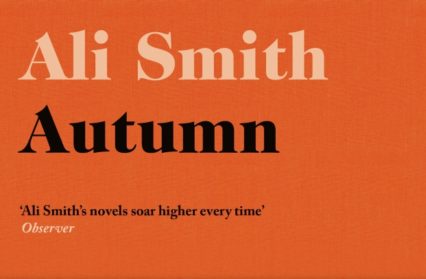All words have associations, associations as numerous and varied as there are people to form them. Autumn, for example. Some associate it with the encroachment of winter: sharper air and longer nights; darkness and cold. Others, with vibrancy: leaves turning to flame and bushes of scarlet berries; the radioactive greens and oranges of Halloween.
Whatever you associate it with, autumn is a time of change and transformation, the transition between summer and winter. The first installment in a seasonal quartet, Ali Smith’s Autumn is now, autumn 2016: the transition between an explosively divisive summer and an anxious, uncertain winter, summarized neatly by the opening line, a deliberate mis-quotation of Dickens: “It was the worst of times, it was the worst of times.”
Autumn follows 101-year-old Daniel Gluck – lover of art, words, stories and one-time Songwriter – and 32-year-old Elisabeth Demand, a “no-fixed-hours casual contract junior lecturer at a university in London…living the dream… if the dream means having no job security and almost everything being too expensive to do and that you’re still living in same rented flat you had as a student over a decade ago.” Elisabeth first met Daniel when she and her mother became his neighbours. Fascinated by this sprightly elderly gentleman and the glimpses of his art collection – what her mother scornfully refers to as “arty art”– they create what will be a defining and lifelong friendship. Now, Daniel is lying in a care home, dreaming of the past, not yet dead but hovering somewhere close, with Elisabeth, adrift in a chaotic present, his only visitor.
In terms of plot Autumn is light, consisting mainly of Elisabeth’s visits to Daniel interspersed with various dreams and flashbacks. It is instead more of a meditation. A meditation on storytelling: how hope can be found through their telling and the fact that change, good and bad, can be wrought through them, for “whoever makes up the story makes up the world.”
On words themselves: the book is full of clever wordplay, references and allusions, from the opening riff on A Tale of Two Cities to a dream in which Elisabeth and Daniel are painting everything white, as a comment on the modern obsession with minimalism, a clear reference to painting the roses red from Alice’s Adventures in Wonderland. Finding them all is like a literary Easter egg hunt. In fact, I’m sure I’ve probably missed quite a few, but I look forward to going back to look for them.
On art and how artists are forgotten and rediscovered: perhaps the biggest artistic influence in the book is that of Pauline Boty (her 1963 painting ‘The Only Blonde in the World’, her interpretation of Marilyn Monroe, even adorns the endpapers). Known as the ‘Wimbledon Bardot’ she was Britain’s only female Pop Artist, one of its founders in fact, whose collages and paintings specialized in depicting a raw, rebellious and unbridled joy in female sexuality – how could you not love someone whose work includes a painting of a very generous rear, cheekily framed by a proscenium arch, the word BUM announced in gloriously large, bright red letters? Sadly, and perhaps inevitably, because of her gender Boty didn’t receive the recognition she deserved during her lifetime, and, after dying at the tragically young age of 28, most of her work ended up in storage only to be ‘rediscovered’ some years later. She exerts a great influence over Daniel and, through Daniel, Elisabeth: Daniel was in love with the woman as well as her art, describing Boty’s collages to Elisabeth before gifting her a book of her artwork.
Nature: Autumn contains some beautiful descriptive passages of the natural world, and trees – as both a symbol of change and transformation – are a recurring motif throughout the novel.
Lastly, and perhaps most importantly, Autumn is a meditation on the world today: the present day segments of the story take place in the aftermath of the EU referendum. Elisabeth is visiting her mother and the village where she lives is a perfect microcosm of the effects: the village feels divided, each half resentful of the other; a house is sprayed with graffiti saying ‘go home’; a piece of what was once common land is fenced off and zealously patrolled by a private security firm, for reasons that are never explained, and society feels ever more divided, petty and bureaucratic – the scenes of Elisabeth trying to renew her passport are sharp enough to cut yourself on and will elicit many a sympathetic wince.
Elisabeth’s mother Wendy encapsulates it nicely:
I’m tired of the news. I’m tired of the way it makes things spectacular that aren’t, and
deals so simplistically with what’s truly appalling. I’m tired of the vitriol. I’m tired of the
anger. I’m tired of the meanness. I’m tired of the selfishness. I’m tired of how we’re doing
nothing to stop it. I’m tired of how we’re encouraging it. I’m tired of the violence there is
and I’m tired of the violence that’s on its way, that’s coming, that hasn’t happened yet. I’m
tired of liars. I’m tired of sanctified liars. I’m tired of how those liars have let this happen.
I’m tired of having to wonder whether they did it out of stupidity or did it on purpose. I’m
tired of lying governments, I’m tired of people not caring whether they’re being lied to
anymore. I’m tired of being made to feel this fearful. I’m tired of animosity. I’m tired of
pusillanimosity
Sentiments you can identify with whichever way you voted, delivered in a tone that is raw, emotional, sincerely angry and confused, but without being polemic.
Ultimately, Autumn is a literate, witty meditation on the redemptive powers of art and literature that also attempts to try and make some sense out of post-Brexit Britain. I’m looking forward to seeing what else Smith has in store for us in the rest of the quartet.











